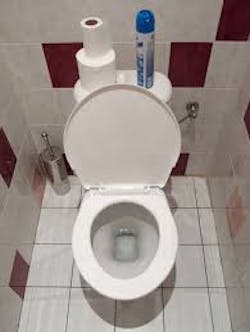Scottish Water aims to reduce sewer clogs with "flushable" labels
IRELAND, JAN 22, 2019 -- Manufacturers of wipes will be able to feature an official water industry 'Fine to Flush' symbol on their packaging if they pass strict scientific tests. This symbol will let consumers know that the products don't contain plastic and will break down in the sewer system instead of clogging up sewers and contributing to fatbergs which cause blockages and sewage overflows.
Peter Farrer, Scottish Water's Chief Operating Officer, said: "The new standard will significantly contribute to reducing the number of chokes in the network, reduce the amount of sewage related debris released to the environment and raise awareness that plastic items should not be flushed down the toilet.
"I would encourage customers who use wipes to look out for the new logo on these products. By switching to a product which is biodegradable you can help us maintain the water management cycle more effectively."
Many wipes contain plastics and do not break down, and cause blockages in the sewer network.
The new labelling scheme means manufacturers of wipes will only be able to feature an official water industry 'Fine to Flush' symbol on their packaging if their products pass strict scientific tests to prove they will break down in the sewer network.
Peter Farrer said: "We all have a part to play in looking after the water cycle. Anything which encourages people to think about their responsibility is welcome. Our sewer response teams deal with the consequences of people flushing the wrong items down the toilet – items like wipes, cotton buds and sanitary products – on a daily basis.
"We hope this new official industry Fine to Flush standard will help cut consumer confusion and lead to a reduction in blockages."
It is estimated that Scottish Water attends an average of 95 blockages in the sewer system across Scotland every day, at a cost of around £6.5 million a year.
Household items which are wrongly flushed down the toilet, as well as the incorrect disposal of fats, oils and grease (FOGs) down drains and sinks, can cause real problems across the network.
FOGs congeal when cooled and stick to items which don't break down in the sewers – the perfect conditions for fatbergs to flourish. These prevent the waste water draining away properly and can cause extremely unpleasant internal sewage flooding or pollute local rivers, coastal waters and beaches.
There are simple steps we can all take to help avoid disrupting the water cycle. In the bathroom, only flush the 3Ps – Pee, Poo and Paper. When it comes to the kitchen, make sure you dispose of FOGs properly and put them in the bin.
FOGs should be left to cool and then scraped into a food waste bin. If no food waste recycling is available, the cooled oil, fat and grease should be put into a sealable container and put in the bin. People should check with their local council, waste/oil recycling site or waste contractor for information on how to recycle or dispose of used fat, oil and grease in their area.
When combined with other items which should not be in our network, the consequences of FOGs can be catastrophic in terms of flooding and pollution. Customers can learn more about what they can do to keep the cycle running, what should and should not be poured down sinks and drains or flushed down toilets and simple ways they can save their drains, protect their homes, their neighbors' homes and the local environment at www.scottishwater.co.uk/cycle.
